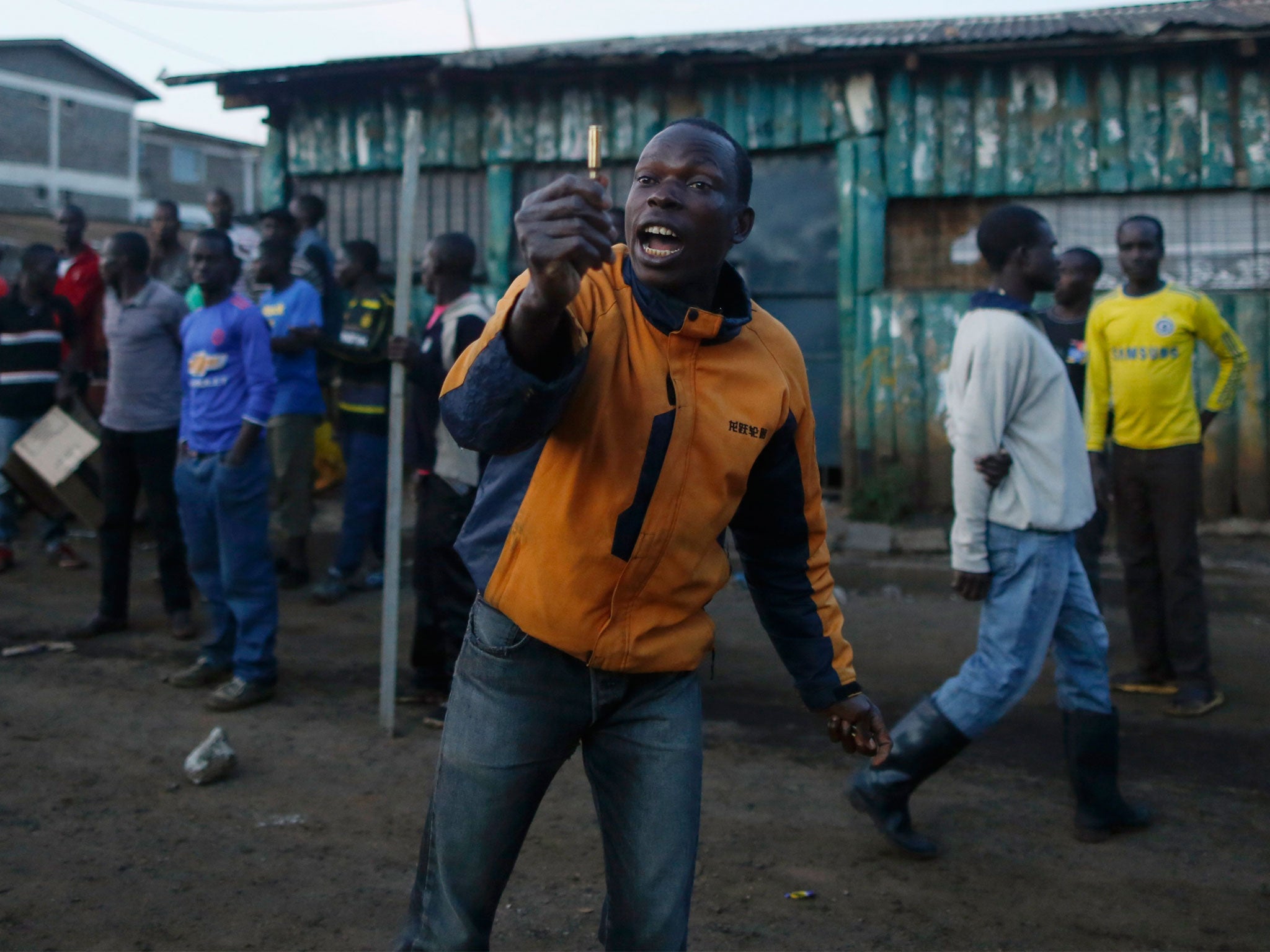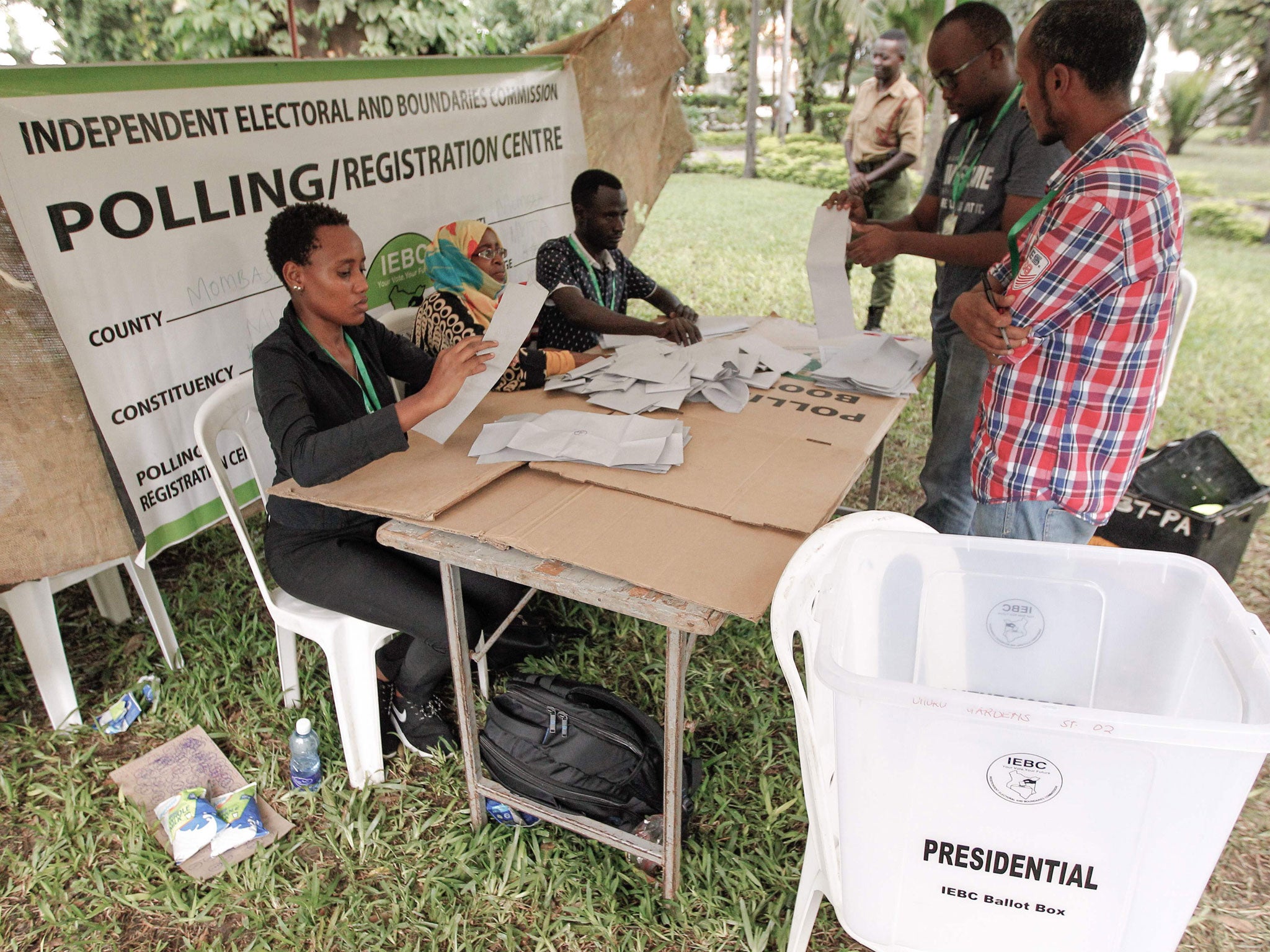Kenya election: Violent clashes and low turnout threaten presidential rerun
At least three people shot dead by security forces in running battles

Your support helps us to tell the story
From reproductive rights to climate change to Big Tech, The Independent is on the ground when the story is developing. Whether it's investigating the financials of Elon Musk's pro-Trump PAC or producing our latest documentary, 'The A Word', which shines a light on the American women fighting for reproductive rights, we know how important it is to parse out the facts from the messaging.
At such a critical moment in US history, we need reporters on the ground. Your donation allows us to keep sending journalists to speak to both sides of the story.
The Independent is trusted by Americans across the entire political spectrum. And unlike many other quality news outlets, we choose not to lock Americans out of our reporting and analysis with paywalls. We believe quality journalism should be available to everyone, paid for by those who can afford it.
Your support makes all the difference.Kenya was hurtling towards a deepening political crisis last night after violent clashes and a record-low turnout in its contentious presidential rerun, suggesting that President Uhuru Kenyatta’s anticipated victory would be a hollow one.
Mr Kenyatta’s return to power seemed assured after Raila Odinga, the opposition leader, withdrew from the fresh race, calling for a boycott of an election that he has condemned as a “sham”.
With Kenyans at their most polarised in a decade, voting in parts of the country got off to a chaotic start, with some polling stations unable to open at all and others forced to delay by several hours.
Police and opposition supporters in slum areas of Nairobi and parts of western Kenya engaged in running battles, with at least three people shot dead by security forces.
In sharp contrast to the August poll, when voters queued during the night and lines snaked around buildings and down streets, many polling stations in the capital, Nairobi, saw just a trickle of voters. Even in areas perceived as strongly supportive of the government, turnout appeared muted.
Kenya was holding its second presidential election in three months after Mr Odinga, an ethnic Luo, successfully challenged his defeat. The Supreme Court annulled the election that handed Mr Kenyatta victory citing procedural irregularities. Mr Kenyatta, a Kikuyu, won 54 per cent of the vote.
But after failing to get the Independent Electoral and Boundaries Commission (IEBC) to meet his demands for electoral reforms and to remove discredited officials, Mr Odinga called on his supporters to boycott the election if it was not postponed.
On the eve of yesterday’s poll, he embarked on a new strategy, saying the National Super Alliance (NASA) was transforming itself from an opposition party into a national resistance movement campaigning for “fresh, free and fair presidential elections” within 90 days.
All eyes will now be on the turnout, which in August reached nearly 80 per cent. A poor turnout could prompt legal challenges and will critically undermine Mr Kenyatta’s legitimacy and his ability to unite the country – at its most polarised since 2007, when a flawed poll plunged the country into deadly ethnically-fuelled violence leaving at least 1,300 dead, and more than 600,000 displaced.
Mr Kenyatta, casting his vote, urged Kenyans to turn out and vote, and accused “tribalists” of trying to disrupt the poll. “We are requesting them humbly that they should turn out in large numbers,” he said. “We’re tired as a country of electioneering and I think it’s time to move forward.”
But some criticised the President for moving ahead with a chaotic election amid growing calls for a delay, both from domestic players and the international community.
“For this election to be free and fair, everyone should be moving together,” said Benjamin Wale, an IT specialist, as he watched police sparring with protesters in Kibera. “This is a section of the country claiming to move forward. All the participants should have reached an agreement before an election. This is not how a national election should be.”
Mr Odinga enjoys strong support in Kibera, and protests quickly turned ugly as polling began, with charred wire and shattered glass strewn across the roads. Olympic Primary School, a central polling station in the slum, was initially barricaded, and eventually opened several hours late.
Police fired tear gas repeatedly to deter protesters, but also potential would-be voters prepared to defy Mr Odinga’s calls for a boycott. Witnesses saw residents harassing people with the tell-tale purple ink on their fingers that showed they had voted.
“The environment is not that welcoming,” said a presiding officer as rocks pounded the roof of the school. “The turnout is zero.”
In the opposition stronghold of Kisumu, hundreds of polling stations did not open at all, and fierce clashes erupted between opposition supporters and police. Twenty-five people were injured in clashes, many from gunshot wounds, said medics.
Hundreds of election officials, meanwhile, did not turn up to work in flashpoints across the country amid a climate of intimidation and violence, and the IEBC later announced that it was postponing polling in four western Kenya constituencies until Saturday.
Kenya’s election has been dogged by intrigue and scandal since the murder of a key IEBC official just days before the August vote.
Then, Mr Kenyatta, who initially appeared to accept the Supreme Court’s decision gracefully, smeared the judges as “crooks” and promised to “fix” the court if re-elected. He also rushed through controversial electoral law amendments that are set to pass into law on 27 October if the President does not send them back for reconsideration.

The credibility of the poll received a fresh blow a little over a week ago when an IEBC official fled the country after receiving threats, prompting her boss, IEBC chairman Wafula Chebukati, to say he wasn’t sure he could deliver “free, fair and credible” elections.
Efforts to delay the elections continued up until the day before the poll, when the Supreme Court was to consider a petition. But five of seven judges did not turn up to work, leading to suggestions from the opposition that the officials had been intimidated, a claim bolstered by an attack on the deputy chief justice’s car the previous evening, when her bodyguard was shot. She was not in the car at the time.
In an unusually sombre statement, the European Union said the lack of a quorum was “highly unusual” for a Supreme Court, and “raised serious questions among Kenyan stakeholders, including about possible political interference”.
It suggested the development would make it that much harder for valid legal challenges to succeed after the new poll. “Not hearing this case has de facto cut off the legal path for remedy,” the EU said.
Join our commenting forum
Join thought-provoking conversations, follow other Independent readers and see their replies
Comments